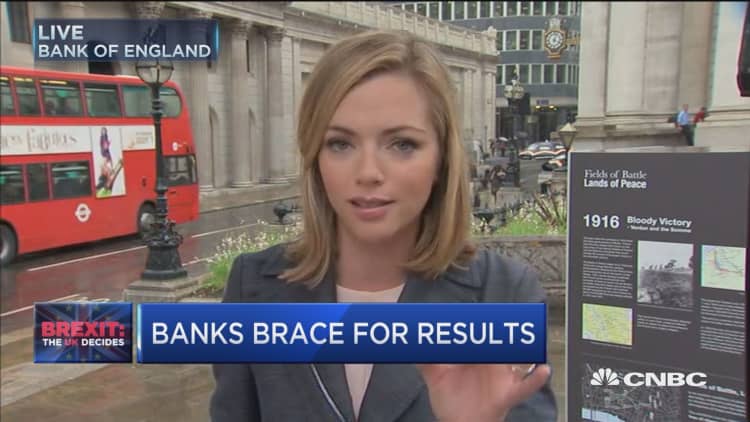As the world awaits the outcome of the United Kingdom's referendum Thursday on whether to remain part of the European Union, some of the major global banks are notifying trading clients that their ability to inject liquidity, or additional capital, into certain key markets will be limited. Central to their worries: potentially extreme volatility in the pound — which traders typically buy or sell against other major currencies, such as the dollar or the euro — that could hurt their balance sheets if they are forced to take the other side of certain client trades.
In recent days, hedge funds and other market participants have received warnings from Goldman Sachs, UBS, Barclays, Bank of America and Citigroup that their ability to place certain buy or sell orders for the pound could be curbed, according to multiple people who have reviewed those notifications. In some cases, according to those people, clients have received more general cautions that the liquidity they'll provide in those markets may also be muted.
"In the event that extreme market moves occur, giving rise to limited liquidity in certain currencies, we may not be able to fill limit orders or take profit orders at the levels, or using the methodologies, expected in normally functioning markets," said UBS in a letter issued to clients in recent days that was reviewed by CNBC. In the note, the bank added that its typical electronic currency trading activities may be curtailed.

At the same time, Bank of America warned clients of potentially similar limitations in its ability to inject liquidity, otherwise known as making markets, in currencies.
The British bank Barclays made headlines earlier on Thursday by refusing to accept certain new currency stop-loss orders, or orders linked to a pre-established price, online. That move, and warnings by UBS and Bank of America's Merrill Lynch unit that they may not be able to provide the customary liquidity to currency markets during and after the British referendum vote, were first reported by Reuters.
However, other banks were issuing similar alerts at the same time. In a memo earlier this week, for instance, Goldman informed clients it would not accept any new stop orders involving sterling, whether placed over the telephone or via the internet, according to two people familiar with the matter. And Citigroup placed a similar constraint on trading clients, said a person familiar with the matter, imposing a $10 million cap on certain sterling orders online. With orders placed over the telephone, this person added, Citigroup's cap would not apply.
On Thursday, one veteran London hedge fund manager who was preparing for the Brexit fallout on Friday said he was astonished by the missives. "We have received letters from four different dealers mentioning that they will not be able to offer the kind of liquidity that they normally offer," said the manager, who asked that he not be named. "And these kinds of letters I have never received in the past."
One senior banking executive told CNBC that volatility gets worse when the machines are in charge: "The only way to prepare is to turn the machines off."
—CNBC's Kayla Tausche and Michelle Caruso-Cabrera contributed to this report.


